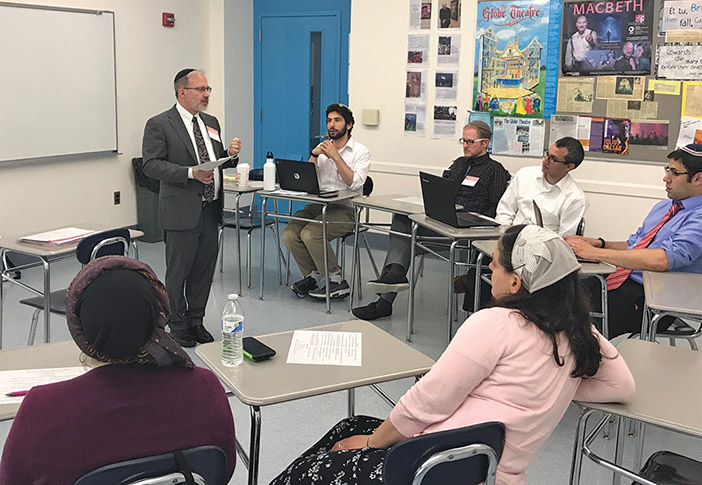


Having participated in many Jewish educational conferences over the years, Rabbi Perry Tirschwell realized that certain specific needs of classroom teachers are sorely neglected. To address this gap, he organized a two-day conference held at The Frisch School on Tuesday, June 12, and at TABC on Wednesday, June 13, at which limudei kodesh teachers from across the U.S. addressed their peers in sessions dealing with subjects and topics of importance to all. Tuesday’s sessions were dedicated to topics in Tanach and machshava. Wednesday’s sessions focused on Torah Sheb’al Peh and Jewish history.
Rabbi Tirschwell, a Teaneck resident, is the founding executive director of the Torah Educators Network. Initiated in September of 2017, the mission of the network is to provide education and services to mechanchim and mechanchot. Having served as the founding head of school of the Katz (formerly Weinbaum) Yeshiva High School in Boca Raton, Florida, for 15 years, Rabbi Tirschwell is well aware of the educational support and services required to create a positive and productive limudei kodesh faculty.
In his opening remarks on Tuesday, Rabbi Tirschwell appropriately and movingly dedicated the conference to the memory of Rabbi Dovid Kaminetsky, suddenly taken from the Jewish community just a few weeks ago. Tirschwell shared that when he came to Frisch High School as a teen, with only a public school background, he was blessed that Rabbi Kaminetsky became not only his math instructor but his Chumash rebbe as well. “As you know, the power of having a frum role model as a general studies teacher is powerful, but having the same teacher for a kodesh and chol class is even more impactful.”
The over 70 attendees at this inaugural conference were outstanding members of limudei kodesh faculty from local high schools including the host schools, Frisch and TABC, as well as Ma’ayanot and Rae Kushner Yeshiva High School, and those from across the country including Shalhevet High School and YULA in Los Angeles, Fuchs Mizrachi in Cleveland, Katz Yeshiva High School in Boca Raton, Kohelet High School in Philadelphia and Ida Crown Jewish Academy in Chicago. New York-area schools were represented by MTA, Central, Ramaz, SAR, Yeshiva of Flatbush, Magen David Yeshiva, DRS, HANC and SKA. Out-of-town participants were subsidized by their schools to attend.
Sessions on Tanach and hashkafa dealt with topics including project-based learning, philosophical and moral questions that arise, davening as a tool for religious engagement, teaching values and emunah through Tanach, and interdisciplinary studies. Topics addressed in the Torah Sheb’al Peh and Jewish history component included the goals of Gemara education, Jewish history as a foundation for discussing core identity issues, balanced teaching about Israel in our times, integrating Jewish and general history and encouraging personal religious growth.
Innovative state-of-the-art online resources for teaching Tanach and Gemara and other limudei kodesh were introduced and demonstrated to the participants who were provided with laptops at each session. Sessions included “Tech & Torah: Strategies for Integration,” which was presented by Sara Wolkenfeld of Ida Crown Academy. Wolkenfeld also serves as the director of education and community engagement for Sefaria, the online learning tool developed in 2011 that provides a free living library of Jewish texts and their interconnections in Hebrew and in translation, to date hosting over 100,000 source sheets.
A session titled “Integrating Jewish Studies Across the Curriculum: Teaching Chet HaEgel as Part of a Spiraled Curriculum” was presented by Rabbi David Stein, director of Gemara education at Shalhevet in addition to being the co-founder of LaHav. Through online courses in Talmud, Tanach, Israel Education and most recently Machshevet Yisrael, LaHav has introduced the concept of a spiraled curriculum that builds critical skills that help students connect ideas, texts and values, enabling them to connect with their Judaism.
Moshe Azizollahoff, director of educational strategy for The Mercava, demonstrated the ever-expanding and robust technological tools being offered by the program. Mercava makes Torah more accessible to the young learner by giving the instructors a huge array of technological skills that break down the text in multiple ways and even provide appropriate images.
Chananya Hoffinger, coming from a decade of teaching Gemara and Tanach, is the developer of Gemara Academy. He demonstrated his multisensory application through which students see a clear “map” of the Gemara text that enables user-friendly learning and efficient chavruta learning.
Lisa Mickley, director of the Online Judaic Studies Consortium, presented the array of courses developed by members of the consortium including students working in online classrooms connecting with highly qualified Judaic studies teachers in schools across North America.
Representatives of Koren Publishers in Jerusalem were present both days and provided participants with a catalog of their extensive offerings in Tanach, tefilla, Oral Law, Tannaitic literature, Rishonim, history, ethics and Jewish philosophy.
Gratified with the enthusiasm of the participants who offered up rave reviews of the sessions, Rabbi Tirschwell is looking forward to hosting future venues for sharing innovative educational resources and approaches. For a comprehensive review of the inaugural conference and to learn more about the Torah Educators Network, email [email protected] or call 201-951-0671.
By Pearl Markovitz
�









